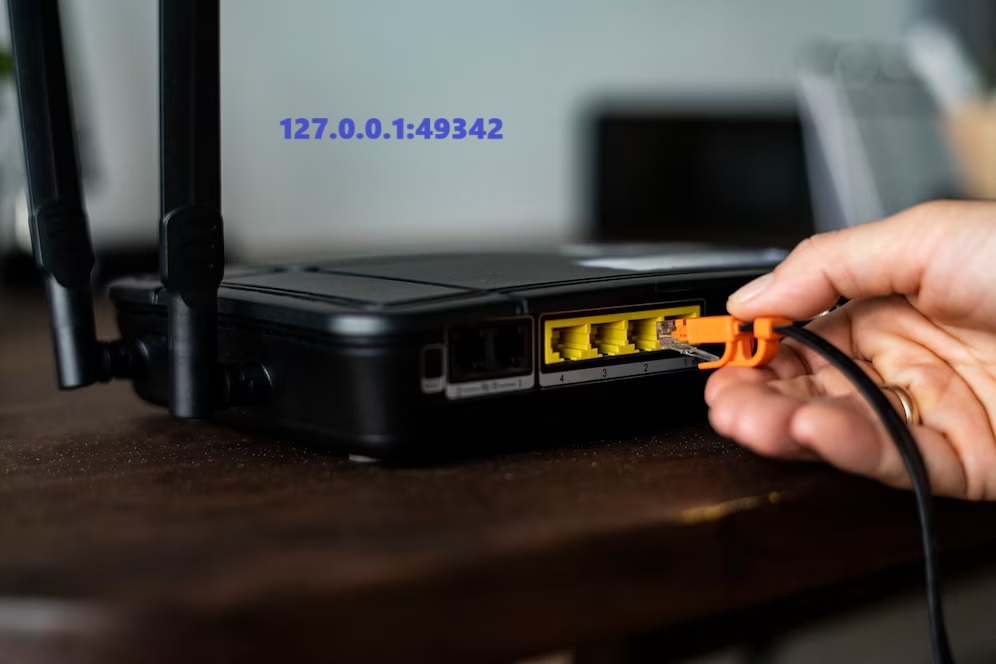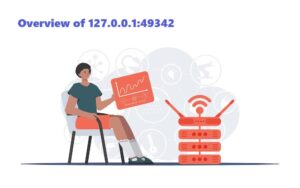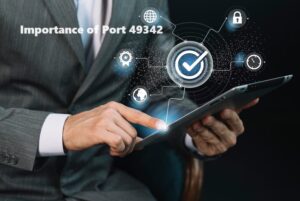
Understanding 127.0.0.1:49342: Explanation, Error, and Solution
In the world of digital computing, many complex terms and phrases often come up, and not everyone is familiar with all of them. One such term is “127.0.0.1:49342,” a common sight on computer screens while using certain applications. Understanding this term is crucial to avoid potential issues. Today, we will delve into what an IP address is, the different types, and why it’s important. Stay with us to learn more.
What is an IP Address?
An IP (Internet Protocol) address is a unique code assigned to every device connected to a network, enabling it to be identified easily. This unique identifier allows devices to communicate with each other, ensuring that data reaches its intended destination without getting lost.
Every device on a network must have a unique IP address to avoid conflicts and ensure efficient communication. Imagine a scenario where multiple devices have the same address. It would be like sending a letter to a building with no apartment numbers. The letter would never reach its intended recipient.
Types of IP Addresses
- IPv4 Address: This type of IP address consists of 32 bits and is represented by four decimal numbers, for example, 192.168.1.1. IPv4 has been the standard for many years, but the sheer number of devices now connected to the internet has led to a shortage of available IPv4 addresses.
- IPv6 Address: Made up of 128 bits, this type of address is displayed in a hexadecimal format, such as 2001:0db8:85a3:0000:0000:8a2e:0370:7334. IPv6 was developed to address the limitations of IPv4, offering a vastly larger pool of addresses and improving routing and network autoconfiguration.
IP addresses are divided into two parts: the host part and the network part. The host part identifies a specific device within a network, while the network part pinpoints a specific network. This segmentation is crucial for efficient routing and management of network traffic.
Static and Dynamic IP Addresses
You may also encounter static and dynamic IP addresses:
- Static IP Address: A permanent address assigned to your device, which does not change. Static IPs are often used for servers or other critical devices where consistent access is required. They are essential for applications such as web hosting, where the IP address must remain constant for users to reliably connect.
- Dynamic IP Address: A temporary address that can change over time. Dynamic IPs are assigned by DHCP (Dynamic Host Configuration Protocol) servers and are commonly used for residential and mobile devices. They are easier to manage and more cost-effective for ISPs, as the address pool can be reused.
Overview of 127.0.0.1:49342

When paired with a port number like 49342, it becomes 127.0.0.1:49342, which signifies a specific application or service running on the same computer. Ports are used to differentiate between multiple services running on the same machine, allowing data to be directed to the correct process.
The address 127.0.0.1:49342 acts as a bridge between the localhost and the application, aiding developers in debugging and testing. The port number 49342 is randomly assigned to a particular application or service on the computer, allowing for precise data transmission to the correct destination via the TCP protocol.
Public vs. Private IP Addresses
Understanding the distinction between public and private IP addresses is essential for network security and functionality:
- Public IP Address: Accessible from the internet, allowing for broader connectivity. Public IP addresses are assigned by ISPs and are unique across the entire internet. They enable devices to be reachable from any other internet-connected device, making them essential for services like web servers and email.
- Private IP Address: Used within a private network, limiting access to certain users and devices. Private IP addresses are not unique globally and can be reused across different private networks. They are used for internal communication within a home, office, or enterprise network, enhancing security by isolating devices from the public internet.
Importance of Port 49342

Port 49342 is crucial for establishing communication between various applications and services on the same system. When hosting a website on your computer, the local server typically processes HTTP requests on port 80. However, running multiple applications or servers simultaneously can cause conflicts. Port 49342 helps in configuring virtual machines and APIs to ensure smooth communication between numerous applications.
Ports, in general, are essential for network communication. They allow multiple services to run on the same IP address by directing traffic to the appropriate application. For instance, while port 80 is typically used for HTTP traffic, port 443 is used for HTTPS traffic, ensuring secure communication.
Processing Localhost Operations
To run applications on localhost, you need to install server software like Apache, Nginx, or IIS on your computer. Once the software is set up, pair it with port 49342 to accept incoming connections. Configure the server paths and access rights appropriately, and create the necessary folders for your apps and websites. Visit your website at 127.0.0.1:49342 to verify the server configuration. If everything is set up correctly, your application should run smoothly on your computer.
Consider using Docker or VirtualBox for managing virtual environments efficiently. These tools allow you to create isolated environments for different applications, reducing the risk of conflicts and simplifying the development process.
Security Implications of 127.0.0.1:49342
Ensuring the security of services running on port 49342 is vital. Unauthorized access can occur if the port is public, so strong security measures are necessary. Always use a VPN when accessing remote servers and virtual machines to maintain secure communication. Keep your OS and server software updated with the latest security patches, and configure your firewall to protect your services.
Security is a critical consideration for any networked application. Ports can be exploited by attackers to gain unauthorized access, so it is crucial to implement robust security practices. This includes using strong passwords, regularly updating software, and monitoring network traffic for suspicious activity.
Conclusion
Understanding 127.0.0.1:49342 is essential for managing localhost operations effectively. This article provides a comprehensive overview of IP addresses, their types, and their importance, ensuring you are well-prepared to handle any issues related to this term.
By understanding the fundamentals of IP addresses and the role of ports, you can troubleshoot and resolve network issues more efficiently. Whether you are a developer, IT professional, or simply a tech enthusiast, this knowledge is invaluable.
Disclaimer
The information provided is well-researched and intended for informational purposes only. We do not endorse the use of third-party platforms and privacy. Instead, we recommend using safe and legal platforms.







